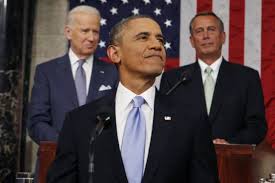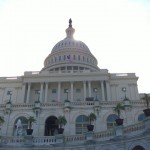 Toward the end of President Obama’s sixth State of the Union address last week unexpected applause prompted the President to improvise. After declaring “I have no more campaigns to run,” much to the delight of some Members of Congress, the President grinned, and reminded the audience why: “I know, because I won both of them.” I smiled as my Facebook and Twitter feeds immediately erupted with praise for the President’s quick wit. The Huffington Post labeled it as the “best moment” of the speech.
Toward the end of President Obama’s sixth State of the Union address last week unexpected applause prompted the President to improvise. After declaring “I have no more campaigns to run,” much to the delight of some Members of Congress, the President grinned, and reminded the audience why: “I know, because I won both of them.” I smiled as my Facebook and Twitter feeds immediately erupted with praise for the President’s quick wit. The Huffington Post labeled it as the “best moment” of the speech.
I admit, the President’s retort made me grin. I was excited to see President Obama in his element, advancing his vision for the remainder of his presidency. Already bolstered by a steadily improving economy, President Obama declared in no uncertain terms how he plans on making the economic recovery complete. Parents need paid sick leave. Women deserve the same compensation as their male counterparts. Community college should be free for eligible students. Veterans must have increased access to educational and job opportunities. The President seemed genuinely excited for the future, convinced our country can improve despite the challenges we face.
Yet, all of the attention on misplaced applause and the President’s comeback obscures the context from which the “I have no more campaigns to run” comment emerged. Referencing his keynote speech at the 2004 Democratic National Convention in Boston, one that catapulted him into the national political scene, President Obama reiterated his vision for an America marked by civility. The President stated:
“A better politics isn’t one where Democrats abandon their agenda or Republicans simply embrace mine. A better politics is one where we appeal to each other’s basic decency instead of our basest fears. A better politics is one where we debate without demonizing each other; where we talk issues, and values, and principles, and facts, rather than “gotcha” moments, or trivial gaffes, or fake controversies that have nothing to do with people’s daily lives.”The President’s call for civility is not limited to those in positions of political power. As our country gears up for another Presidential election season, we are all bound to engage in conversation with those who do not share our exact political or religious beliefs. What struck me most about the President’s remarks is his insistence that civil, political discourse doesn’t try to obscure difference. In interacting with those who think differently about various issues, our goal is not to either convert the person to our way of thinking or focus solely on what we agree upon.
Progressive people of faith needn’t shy away from democratic principles. We must remain committed to expanding economic opportunities for lower and middle class individuals. We must ensure women have access to reproductive health care. We must work for compassionate and comprehensive immigration reform. We must stand by those who are targeted because of the color of their skin, or their gender expression and sexual orientation.
Standing firmly by our convictions does not necessitate partisan bickering or name calling. In our effort to secure a bright and equal future for the larger society, we must recognize the humanity even in those with whom we passionately disagree. We must take the time to listen closely to our political “enemy” without the sole desire to change their minds. When we are quick to listen and slow to speak, we gain a much better understanding of what causes a person to hold a particular viewpoint. I am still able to hold to my political and religious beliefs without assuming I have all the answers or there is no truth in opposing opinions.
When we do this we can find creative solutions to the problems facing our communities, country, and world. I’m not suggesting we give credence to every position or allow for civil dialogue to become grounds for virulent hate speech. Some ideas are dangerous and some speech, especially if it incites violence, is unacceptable.
My faith in God, though, compels me to make space at the table for those who think very differently than I do. I am reminded the struggle for justice and equality is not about me or my vision for the world. It is about working across religious, political, and cultural lines to help create a better society at large.
I’m not politically neutral, after all I did enjoy the moment when the President quickly halted the cheers of his Republican colleagues. But my own particularity won’t prohibit me from trying to model civility and humility in conversations with those who think differently. This stance is often construed as naïve or overly optimistic; however, I am not presuming these conversations will be easy, or that change will happen quickly. We may still roll our eyes when an opponent voices their concerns. Our political arena may still be rife with partisan bickering and gridlock. But maybe, if we stick to our principles while remaining in relationships with those who think differently, the generations that follow will find ways to break down barriers and work for true progress.
Kyle Cristofalo received his Master of Divinity from Emory University where he concentrated in Justice, Peacebuilding, and Conflict Transformation. Kyle most recently served as a fellow at the Presbyterian Church (U.S.A.) Office of Public Witness in Washington, D.C., working primarily on issues relating to Israel/Palestine, as well as immigration.











